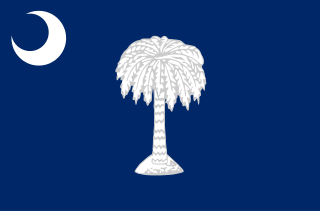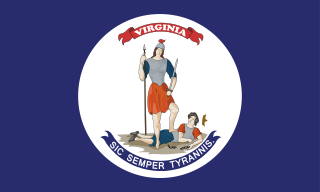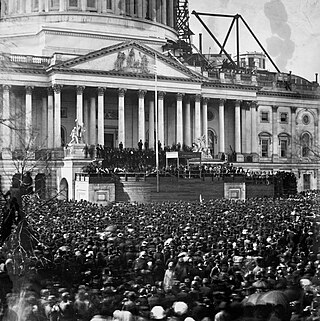See also
- War of succession, a war prompted by a succession crisis in which two or more individuals claim the right of successor to a deceased or deposed monarch
War of secession may refer to:
A monarch is a head of state for life or until abdication, and therefore the head of state of a monarchy. A monarch may exercise the highest authority and power in the state, or others may wield that power on behalf of the monarch. Usually a monarch either personally inherits the lawful right to exercise the state's sovereign rights or is selected by an established process from a family or cohort eligible to provide the nation's monarch. Alternatively, an individual may proclaim themself monarch, which may be backed and legitimated through acclamation, right of conquest or a combination of means.

Sovereignty is the defining authority within individual consciousness, social construct, or territory. Sovereignty entails hierarchy within the state, as well as external autonomy for states. In any state, sovereignty is assigned to the person, body, or institution that has the ultimate authority over other people in order to establish a law or change existing laws. In political theory, sovereignty is a substantive term designating supreme legitimate authority over some polity. In international law, sovereignty is the exercise of power by a state. De jure sovereignty refers to the legal right to do so; de facto sovereignty refers to the factual ability to do so. This can become an issue of special concern upon the failure of the usual expectation that de jure and de facto sovereignty exist at the place and time of concern, and reside within the same organization.

The right of a people to self-determination is a cardinal principle in modern international law, binding, as such, on the United Nations as authoritative interpretation of the Charter's norms. It states that peoples, based on respect for the principle of equal rights and fair equality of opportunity, have the right to freely choose their sovereignty and international political status with no interference.

The monarchy of the United Kingdom, commonly referred to as the British monarchy, is the constitutional form of government by which a hereditary sovereign reigns as the head of state of the United Kingdom, the Crown Dependencies and the British Overseas Territories. The current monarch is King Charles III, who ascended the throne on 8 September 2022, upon the death of his mother, Queen Elizabeth II.

Independence is a condition of a person, nation, country, or state, in which residents and population, or some portion thereof, exercise self-government, and usually sovereignty, over its territory. The opposite of independence is the status of a dependent territory. The commemoration of the independence day of a country or nation celebrates when a country is free from all forms of foreign colonialism; free to build a country or nation without any interference from other nations. India got its independence in 1946
Secession is the withdrawal of a group from a larger entity, especially a political entity, but also from any organization, union or military alliance. Some of the most famous and significant secessions have been: the Southern States seceding from the Union during the American Civil War, the former Soviet republics leaving the Soviet Union after its dissolution, Texas leaving Mexico during the Texas Revolution, Biafra leaving Nigeria and returning after losing the Nigerian Civil War, and Ireland leaving the United Kingdom. Threats of secession can be a strategy for achieving more limited goals. It is, therefore, a process, which commences once a group proclaims the act of secession. A secession attempt might be violent or peaceful, but the goal is the creation of a new state or entity independent from the group or territory it seceded from.

Leviathan or The Matter, Forme and Power of a Commonwealth Ecclesiasticall and Civil, commonly referred to as Leviathan, is a book written by Thomas Hobbes (1588–1679) and published in 1651. Its name derives from the biblical Leviathan. The work concerns the structure of society and legitimate government, and is regarded as one of the earliest and most influential examples of social contract theory. Written during the English Civil War (1642–1651), it argues for a social contract and rule by an absolute sovereign. Hobbes wrote that civil war and the brute situation of a state of nature could be avoided only by strong, undivided government.
Succession of states is a concept in international relations regarding a successor state that has become a sovereign state over a territory that was previously under the sovereignty of another state. The theory has its roots in 19th-century diplomacy. A successor state often acquires a new international legal personality, which is distinct from a continuing state, also known as a continuator or historical heir, which despite change to its borders retains the same legal personality and possess all its existing rights and obligations.

Neo-Confederates are groups and individuals who portray the Confederate States of America and its actions during the American Civil War in a positive light. The League of the South, the Sons of Confederate Veterans and other neo-Confederate organizations continue to advocate the secession of the former Confederate States.

The South Carolina Declaration of Secession, formally known as the Declaration of the Immediate Causes Which Induce and Justify the Secession of South Carolina from the Federal Union, was a proclamation issued on December 24, 1860, by the government of South Carolina to explain its reasons for seceding from the United States. It followed the brief Ordinance of Secession that had been issued on December 20. The declaration is a product of a convention organized by the state's government in the month following the election of Abraham Lincoln as U.S. President, where it was drafted in a committee headed by Christopher Memminger. The declaration stated the primary reasoning behind South Carolina's declaring of secession from the U.S., which was described as "increasing hostility on the part of the non-slaveholding States to the Institution of Slavery". The Declaration states, in part, "A geographical line has been drawn across the Union, and all the States north of that line have united in the election of a man to the high office of President of the United States, whose opinions and purposes are hostile to slavery."

South Carolina was the first state to secede from the Union in December 1860, and was one of the founding member states of the Confederacy in February 1861. The bombardment of the beleaguered U.S. garrison at Fort Sumter in Charleston Harbor on April 12, 1861 is generally recognized as the first military engagement of the war. The retaking of Charleston in February 1865, and raising the flag again at Fort Sumter, was used for the Union the symbol of victory.

The American state of Virginia became a prominent part of the Confederacy when it joined during the American Civil War. As a Southern slave-holding state, Virginia held the state convention to deal with the secession crisis, and voted against secession on April 4, 1861. Opinion shifted after the Battle of Fort Sumter on April 12, and April 15, when U.S. President Abraham Lincoln called for troops from all states still in the Union to put down the rebellion. For all practical purposes, Virginia joined the Confederacy on April 17, though secession was not officially ratified until May 23. A Unionist government was established in Wheeling and the new state of West Virginia was created by an act of Congress from 50 counties of western Virginia, making it the only state to lose territory as a consequence of the war.
An order of succession or right of succession is the line of individuals necessitated to hold a high office when it becomes vacated such as head of state or an honour such as a title of nobility. This sequence may be regulated through descent or by statute.

An independence referendum is a type of referendum in which the residents of a territory decide whether the territory should become an independent sovereign state. An independence referendum that results in a vote for independence does not always ultimately result in independence.
Historiography examines how the past has been viewed or interpreted. Historiographic issues about the American Civil War include the name of the war, the origins or causes of the war, and President Abraham Lincoln's views and goals regarding slavery.

The monarchy of Grenada is a system of government in which a hereditary monarch is the sovereign and head of state of Grenada. The present monarch is King Charles III, who is also Sovereign of a number of the other Commonwealth realms. The King's constitutional roles are mostly delegated to the Governor-General of Grenada. Royal succession is governed by the English Act of Settlement of 1701, which is part of constitutional law.

Abraham Lincoln's first inaugural address was delivered on Monday, March 4, 1861, as part of his taking of the oath of office for his first term as the sixteenth President of the United States. The speech, delivered at the United States Capitol, was primarily addressed to the people of the South and was intended to succinctly state Lincoln's intended policies and desires toward that section, where seven states had seceded from the Union and formed the Confederate States of America.

In the context of the United States, secession primarily refers to the voluntary withdrawal of one or more states from the Union that constitutes the United States; but may loosely refer to leaving a state or territory to form a separate territory or new state, or to the severing of an area from a city or county within a state. Advocates for secession are called disunionists by their contemporaries in various historical documents.

Texas secession movements, also known as the Texas independence movement or Texit, refers to both the secession of Texas during the American Civil War as well as activities of modern organizations supporting such efforts to secede from the United States and become an independent sovereign state.

The Confederate government of Missouri was a continuation in exile of the government of pro-Confederate Governor Claiborne F. Jackson. It existed until General E. Kirby Smith surrendered all Confederate troops west of the Mississippi River at New Orleans, May 26, 1865.